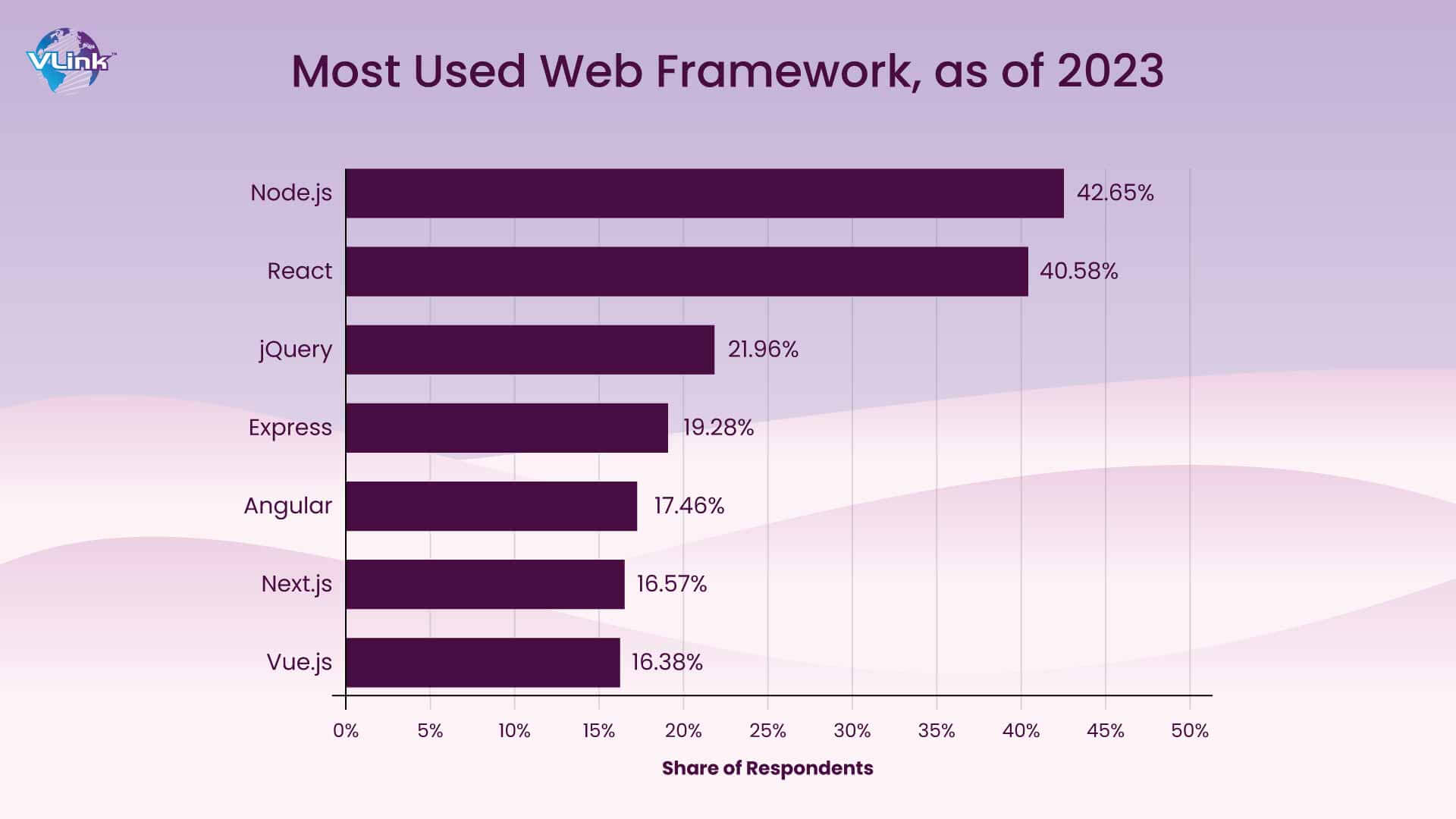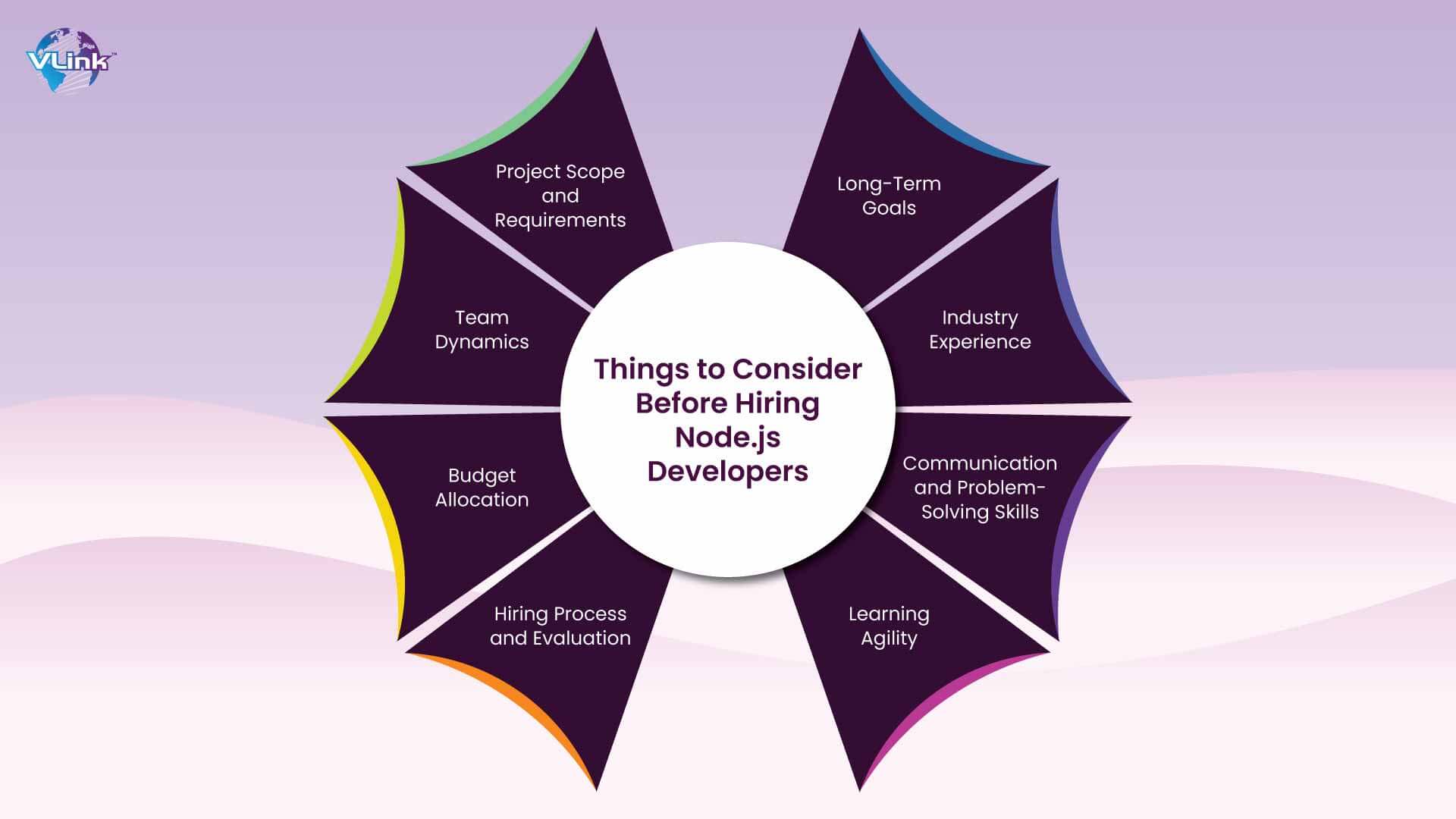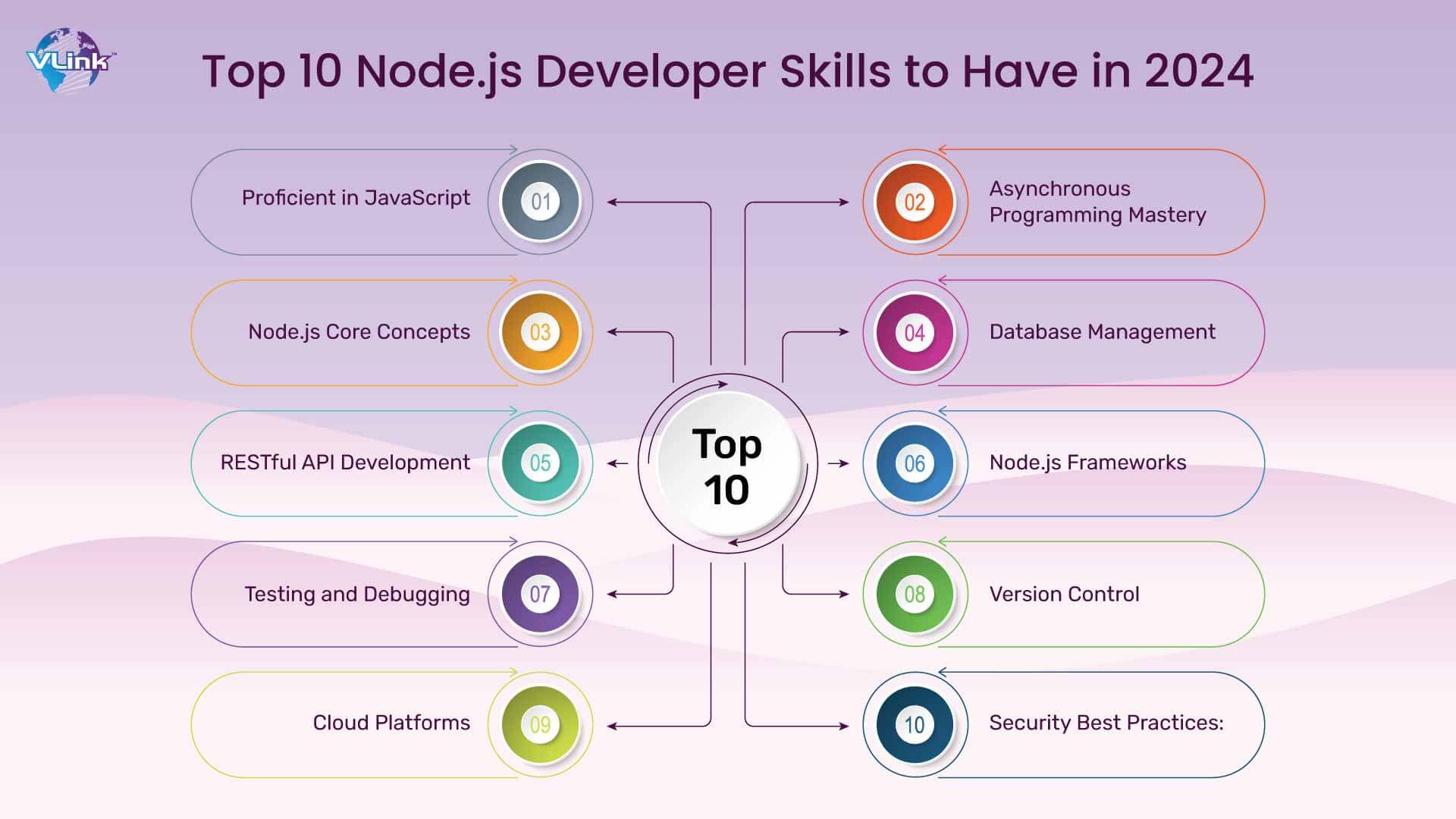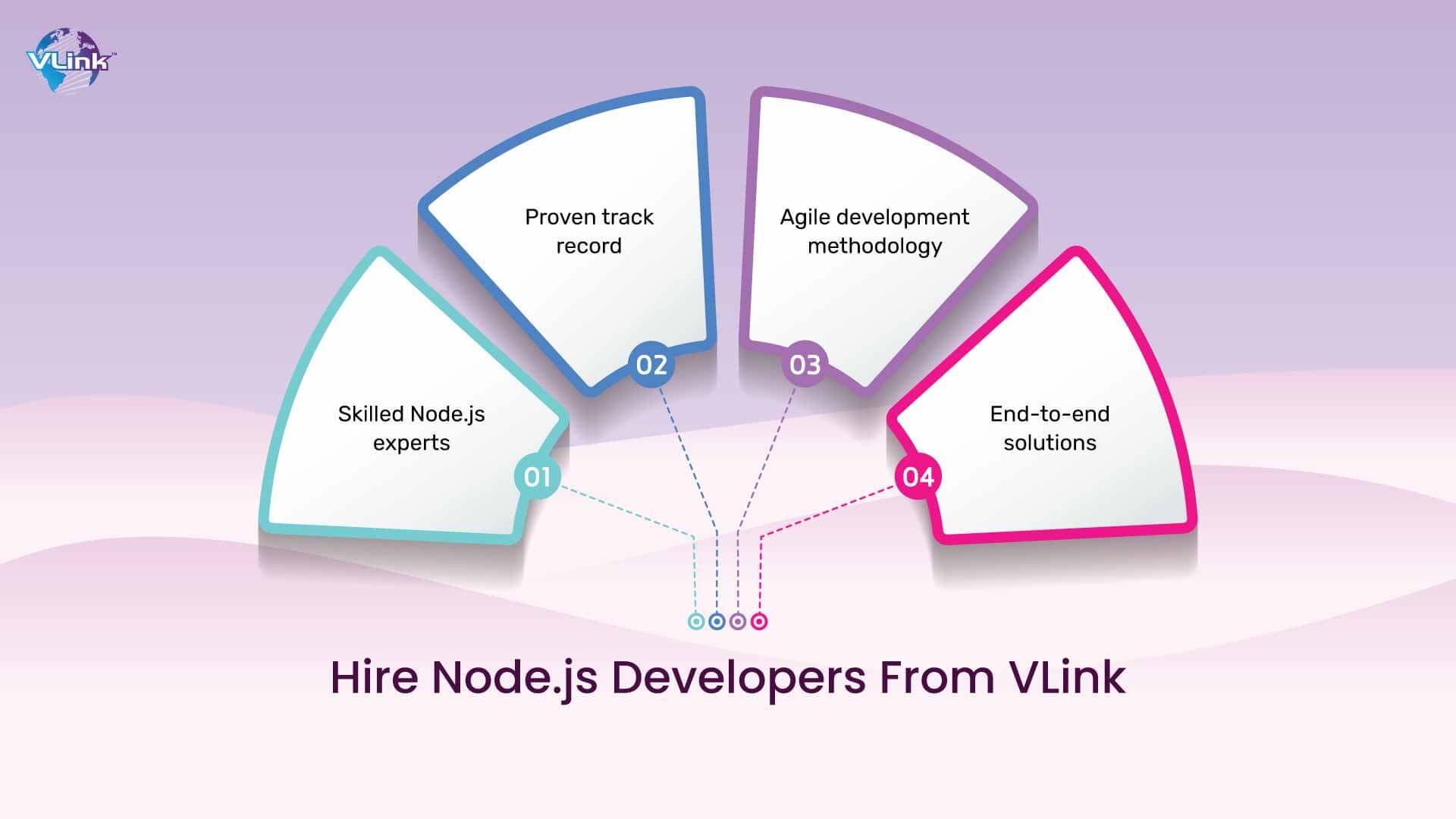
As a result, the demand for Node.js developers have surged, making it an asset for companies seeking to stay competitive in the digital landscape.
This comprehensive guide will delve into the reasons why companies prefer Node.js developers, crucial factors to consider before hiring, the top 10 Node.js developer skills for 2024, the benefits of hiring a Node.js developer, and real-world case studies showcasing the power of Node.js.
Why Do Companies Prefer Node.js Developers?
Here are a few reasons why Node.js developers are in demand:
- Scalability: Node.js excels at handling concurrent connections efficiently, making it ideal for applications with fluctuating workloads.
- Speed: Its non-blocking, event-driven architecture enables rapid development and execution, resulting in faster application performance.
- Cost-effectiveness: Node.js's single-language stack (JavaScript) reduces development time and costs by eliminating the need for different languages for front-end and back-end development.
- Large and active community: A vast community of developers contributes to a rich ecosystem of libraries, frameworks, and tools, accelerating development and problem-solving.
- Full-stack development: Node.js allows developers to work on both front-end and back-end development using JavaScript, enhancing productivity and collaboration.
Things to Consider Before Hiring Node.js Developers

Before you wish to hire Node.js Developers, carefully assess the following factors:
- Project Scope and Requirements: Clearly define the project's goals, functionalities, and expected scale. This will help identify the specific skill set required for your Node.js developer.
- Team Dynamics: Consider how a new Node.js developer will fit into your existing team's culture, work style, and expertise. Evaluate if their communication and collaboration skills align with your team's values.
- Budget Allocation: Determine a realistic budget for hiring and retaining a Node.js developer—factor in salary, benefits, and potential training costs.
- Hiring Process and Evaluation: Develop a structured hiring process that includes technical assessments, coding challenges, and interviews to evaluate candidates effectively. Clearly outline the evaluation criteria to ensure a fair and consistent process.
- Long-Term Goals: Consider your company's plans and how a Node.js developer fits your long-term growth strategy. Evaluate if their skills and experience align with your organization's evolving needs.
- Industry Experience: If your project involves a specific industry (e.g., fintech, healthcare), look for developers with relevant experience to accelerate project timelines and reduce potential challenges.
- Communication and Problem-Solving Skills: Effective communication and problem-solving are essential for any developer. Assess candidates' ability to articulate technical concepts and approaches to overcoming challenges.
- Learning Agility: The technology landscape is constantly evolving. A developer eager to learn new tools and technologies will be better equipped to adapt to future project requirements.
By carefully considering these factors, you can increase your chances of finding a Node.js developer who perfectly fits your team and project.
Note:- Before diving into the hiring process, it's crucial to understand your project's specific requirements clearly. Define the project scope, scale, and desired functionalities to identify the essential skill set for your Node.js developer.
Top 10 Node.js Developer Skills to Have in 2024

Now, let's dive deep into essential skills to consider before hiring Node.js Developers.
1. Proficient in JavaScript:
- Beyond syntax: Candidates should demonstrate a firm grasp of advanced JavaScript concepts like closures, prototypes, and functional programming paradigms.
- ES6+ features: Familiarity with modern JavaScript features like arrow functions, destructuring, and modules is crucial for writing clean and efficient code.
2. Asynchronous Programming Mastery:
- Event loop understanding: Candidates should deeply understand the Node.js event loop and how it handles asynchronous operations.
- Error handling: Proficiency in handling asynchronous errors using try-catch blocks, promises, and async/await is essential to prevent application crashes.
- Performance optimization: Knowledge of techniques to optimize asynchronous code for better performance, such as using async/await judiciously and avoiding callback hell.
3. Node.js Core Concepts:
- Module system: Understanding the CommonJS module system and how to create and use custom modules.
- Buffer handling: Proficiency in working with binary data using Node.js buffers.
- Stream API: Knowledge of readable and writable streams for efficient data handling.
- Child processes: Understanding how to spawn child processes and communicate with them.
- Cluster module: Awareness of the cluster module for utilizing multiple CPU cores.
4. Database Management:
- SQL and NoSQL: Proficiency in both relational and NoSQL databases to handle different data structures and query patterns.
- ORM/ODM: Experience with ORMs like Sequelize or Mongoose to interact with databases efficiently.
- Database performance optimization: Knowledge of indexing, query optimization, and database design for optimal performance.
5. Restful API Development:
- API design principles: Understanding RESTful API design principles, including HTTP methods, status codes, and resource-based URLs.
- API versioning: Ability to plan for API evolution and maintain backward compatibility.
- API security: Knowledge of authentication and authorization mechanisms (OAuth, JWT) to protect API endpoints.
6. Node.js Frameworks:
- Express.js: Proficiency in Express.js for building web applications and APIs.
- NestJS: Knowledge of NestJS for building scalable and maintainable enterprise-grade applications.
- Koa.js: Understanding Koa.js for building custom middleware and high-performance applications.
- Framework comparison: Ability to choose the proper framework based on project requirements.
7. Testing and Debugging:
- Unit testing: Proficiency in writing unit tests using Jest or Mocha to ensure code quality.
- Integration testing: Experience in testing the interaction between different components.
- Debugging tools: Familiarity with Node.js debugging tools like the Chrome DevTools or Node Inspector.
8. Version Control:
- Git proficiency: Strong command of Git for managing code changes, collaborating with teams, and resolving conflicts.
- Git workflows: Understanding different Git workflows like Gitflow or GitHub Flow.
- Code review: Ability to provide constructive feedback on code and collaborate effectively with other developers.
9. Cloud Platforms:
- Platform familiarity: Experience with at least one cloud platform (AWS, GCP, Azure) for deploying and managing Node.js applications.
- Serverless architecture: Understanding serverless functions and their benefits for building scalable applications.
- Infrastructure as code: Knowledge of tools like Terraform or AWS CloudFormation for managing cloud resources.
10. Security Best Practices:
- Vulnerability awareness: Understanding common Node.js vulnerabilities like injection attacks, cross-site scripting (XSS), and cross-site request forgery (CSRF).
- Secure coding practices: Ability to write secure code by following best practices and using security libraries.
- Authentication and authorization: Implementing robust authentication and authorization mechanisms.
By carefully considering these skills, you can build a Node.js development team capable of delivering high-quality, performant, and secure applications.
Node.js Case Studies
Node.js has proven its mettle in powering some of the world's most popular and demanding applications.
Let's explore a few notable examples:
- Netflix: This streaming giant leveraged Node.js to significantly improve startup time and reduce server-side rendering time, resulting in a smoother user experience.
- LinkedIn: Node.js played a pivotal role in enabling LinkedIn to handle a surge in mobile traffic while maintaining exceptional performance and responsiveness.
- Uber: The ride-sharing behemoth relies on Node.js to build a scalable, real-time platform that efficiently matches riders with drivers.
- PayPal: By adopting Node.js, PayPal achieved a remarkable improvement in transaction processing speed and reduced response times.
- NASA: Even the space agency has embraced Node.js to modernize its systems, improving data access and analysis efficiency.
These case studies underscore the versatility and power of Node.js in tackling complex challenges and delivering exceptional results.
Hire Node.js Developers from VLink

Are you looking to build scalable, high-performance applications? VLink offers top-tier Node.js developers who can turn your vision into reality. Our team of seasoned professionals possesses in-depth knowledge of the Node.js ecosystem, enabling us to deliver exceptional solutions tailored to your needs.
Experience the VLink difference:
- Skilled Node.js experts: Our developers are meticulously selected for their expertise in Node.js and its vast array of tools and frameworks.
- Proven track record: We have a history of successful Node.js projects across various industries, demonstrating our ability to deliver results.
- Agile development methodology: Our agile approach ensures flexibility, transparency, and rapid development cycles.
- End-to-end solutions: From concept to deployment, we provide comprehensive Node.js development services, including API development, real-time applications, and cloud integration.
Are you ready to embark on your Node.js development journey? Contact VLink today to discuss your project requirements and learn how our expert developers can help you achieve your goals.
Wrap-Up!
Hiring the right Node.js developers is paramount to your project's success. By carefully considering the essential skills outlined in this guide and conducting thorough interviews, you can build a development team capable of delivering exceptional results.
Remember, a skilled Node.js developer possesses a strong foundation in JavaScript, a deep understanding of asynchronous programming, and expertise in core Node.js concepts. Additionally, database management, version control, cloud platforms, and security proficiency are crucial for building robust and scalable applications.










 Shivisha Patel
Shivisha Patel

















